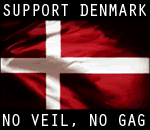Two The Best On Big Changes
Mark Steyn begins his article on Middle East democracy with an "I told you so":
Christopher Hitchens, the one bright light of the Left, asks the question, "When was the last time you heard some glib pundit employing the phrase "The Arab Street"?" In much the same manner that Mark Steyn scolds his Tory brothers, Mr. Hitchens shines a bright light on some of the dimmer members of his fraternity.
Three years ago - April 6 2002, if you want to rummage through the old Spectators in the attic - I wrote: "The stability junkies in the EU, UN and elsewhere have, as usual, missed the point. The Middle East is too stable. So, if you had to pick only one regime to topple, why not Iraq? Once you've got rid of the ruling gang, it's the West's best shot at incubating a reasonably non-insane polity. That's why the unravelling of the Middle East has to start not in the West Bank but in Baghdad."He ends with:
But some of us - notably US deputy defence secretary Paul Wolfowitz - thought things would go a lot better than that. Wolfowitz was right, and so was Bush, and the Left, who were wrong about the Berlin Wall, were wrong again, the only difference being that this time they were joined in the dunce's corner of history by far too many British Tories. No surprise there. The EU's political establishment doesn't trust its own people, so why would they trust anybody else's? Bush trusts the American people, and he's happy to extend the same courtesy to the Iraqi people, the Syrian people, the Iranian people, etc.There is much in between.
Prof Glenn Reynolds, America's Instapundit, observes that "democratisation is a process, not an event". Far too often, it's treated like an event: ship in the monitors, hold the election, get it approved by Jimmy Carter and the UN, and that's it. Doesn't work like that. What's happening in the Middle East is the start of a long-delayed process. Eight million Iraqis did more for the Arab world on January 30 than 7,000 years of Mubarak-pace marching.
Christopher Hitchens, the one bright light of the Left, asks the question, "When was the last time you heard some glib pundit employing the phrase "The Arab Street"?" In much the same manner that Mark Steyn scolds his Tory brothers, Mr. Hitchens shines a bright light on some of the dimmer members of his fraternity.
In retrospect, it's difficult to decide precisely when this annoying expression began to expire, if only from diminishing returns. There was, first, the complete failure of the said "street" to detonate with rage when coalition forces first crossed the border of Iraq, as had been predicted (and one suspects privately hoped) by so many "experts." But one still continued to hear from commentators who conferred street-level potency on passing "insurgents." (I remember being aggressively assured by an interviewer on Al Franken's quasi-comedic Air America that Muqtada Sadr's "Mahdi Army" in Najaf was just the beginning of a new "Tet Offensive.") Mr. Sadr duly got a couple of seats in the recent Iraqi elections. And it was most obviously those elections that discredited the idea of ventriloquizing the Arab or Muslim populace or of conferring axiomatic authenticity on the loudest or hoarsest voice.After developing his argument, he hopes for the swift death of an equally malicious term:
The same will hold true, one hopes, for the cheap propagandists who have lately been flourishing the term "Islamophobia." This word, or slogan, has been gaining ground among soft defenders of Islamism in Europe. It is used to put a stop to discussion about the political aims of Islamists in non-Islamic societies, and it has most recently generated great nervousness in Britain - sufficient nervousness to decide the Blair government to introduce legislation to make criticism of Islam into a prohibited hate crime.One wonders if by "cheap propagandists", he might mean CAIR. I suspect not, but perhaps he should. (For more information, see Anti-CAIR.)








<< Home